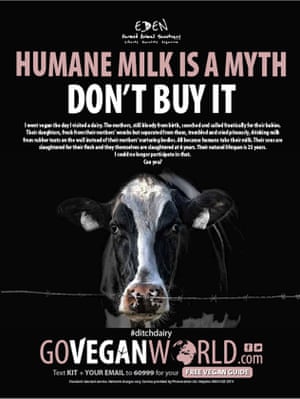ASA rejected claims from dairy industry that advert was ‘misleading’ readers into thinking farms were not complying with animal welfare standards.

An advertisement stating that “humane milk is a myth” has been cleared by the regulator following complaints from members of the dairy industry that it was inaccurate and misleading.
The national newspaper advert in February for campaign group Go Vegan World featured a photo of a cow behind a piece of barbed wire and the headline “Humane milk is a myth. Don’t buy it”.
“Their daughters, fresh from their mothers’ wombs but separated from them, trembled and cried piteously, drinking milk from rubber teats on the wall instead of their mothers’ nurturing bodies. All because humans take their milk.”
The Advertising Standards Authority (ASA) said seven complainants, some of whom had experience of working in the dairy industry and who believed that the advert did not accurately describe the way that dairy cattle were generally treated in the UK, challenged whether the claims were misleading and could be substantiated.
Go Vegan World said the advert did not state or imply that calves were separated from their mothers before the 12 to 24 hours recommended by the Department for Environment, Food and Rural Affairs (Defra).
But in any case they believed the exact timing of the separation was irrelevant to the ad, which commented on the injustice of separating cow and calf, claiming later separation actually caused more distress.
They believed most people would consider separation at 25 hours as unjust as separation at 24 hours.
Clearing the advert, the ASA said it understood the complainants were concerned the advert implied a significant number of dairy farms did not comply with animal welfare standards in place in the UK and milk production was therefore “inhumane” in that sense.
But it concluded: “We understood that Defra recommended that calves should be kept with their mothers for at least 12 and preferably 24 hours after birth.
“Although the language used to express the claims was emotional and hard-hitting, we understood it was the case that calves were generally separated from their mothers very soon after birth, and we therefore concluded that the ad was unlikely to materially mislead readers.”
Since you’re here …
… we have a small favour to ask. More people are reading the Guardian than ever but advertising revenues across the media are falling fast. And unlike many news organisations, we haven’t put up a paywall – we want to keep our journalism as open as we can. So you can see why we need to ask for your help. The Guardian’s independent, investigative journalism takes a lot of time, money and hard work to produce. But we do it because we believe our perspective matters – because it might well be your perspective, too.
If everyone who reads our reporting, who likes it, helps to support it, our future would be much more secure.